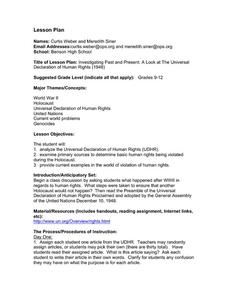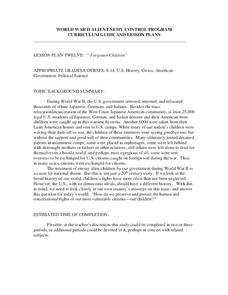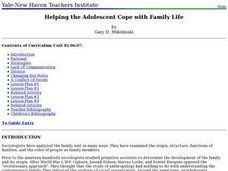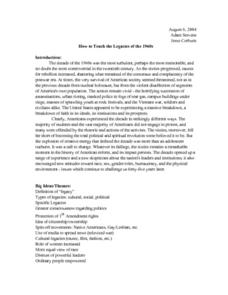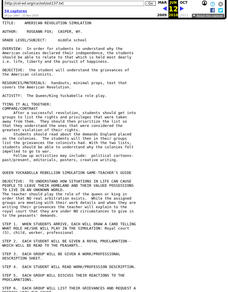Curated OER
Children's Attitudes about Slavery and Women's Abolitionism as Seen through Antislavery Fairs
Students examine attitudes of children from the North growing up during the time of slavery. Using documents, they discover how abolitionists tried to change people's ideas of using slaves. They explore how women used antislavery fairs...
West Virginia Department of Education
Declarations and the Quest for Life, Liberty and the Pursuit of Happiness
Understanding how John Brown got his inspiration from the Declaration of Independence helps learners further understand both West Virginia and United States history. The resource, a standalone, uses worksheets, discussion, and essay...
Curated OER
Lines Of Connection
We need the help of your history detectives! After giving them a set of questions to answer, reading groups must create their own timeline of the events. Then, as a class, have each group present their timelines. What is different? Why...
Curated OER
Underground Railroad
Fourth graders use internet cites to explore the Underground Railroad. They also learn the importance of the Emancipation Proclamation. Focus questions are included.
Curated OER
Understanding Causes of Global Conflict: Peer Interviews
Young scholars examine sources of conflict. In this global conflict lesson, students discuss how peer pressure, bias, oppression, ethnocentrism, miscommunication, and fear contribute to personal conflict as well as global conflict. Young...
Curated OER
Investigating Past and Present: A Look at The Universal Declaration of Human Rights
Students compare the Universal Declaration of Human Rights to the war crimes of WWII. In this lesson on Human Rights, students evaluate the causes of WWII, war crimes, and determine whether the outcome might have been different otherwise.
Curated OER
North or South? Which has a better way of life?
Sixth graders brainstorm what they believe are the causes of the Civil War. They copy the blank circle graph into their Social Studies journals twice once for their prediction and once for the actual. Students list the following...
Curated OER
This Guilty Land
Middle schoolers examine the time period just before the start of the Civil War. They focus on John Brown, an activist of the day. After a lecture/demo, students use a worksheet imbedded in this plan to further their understanding of the...
Curated OER
Southern Patriotism
Students identify and assess the role patriotism had in southern seccession. They evaluate the effect of Southerners' feelings of national pride in determining their entrance into the Civil War.
Curated OER
World War II Alien Enemy Control Program
Students become familiar with the concepts of human rights and constitutional rights. They have an increased awareness of the historical record as to the cessation of these rights, especially in regards to children during WWII. It is...
Curated OER
Draw It Out
Students consider other great episodes of civil unrest in the nation's history. They think about what causes riots, what form they take, and how they end. It also provides lessons in peaceful conflict resolution.
National Endowment for the Humanities
Revolution '67, Lesson 2: What Happened in July 1967? How Do We Know?
Even in a world in which dozens of participants and curious onlookers record every controversial event, the basic facts of what happened are often in dispute. Revolution '67, Lesson 2 explores 1967 Newark, New Jersey using an examination...
National Endowment for the Humanities
Revolution '67, Lesson 1: Protest: Why and How
To some people, protesting is as American as apple pie, but the factors that lead to protests can be as confusing to veteran activists as to today's youth. Revolution '67 explores the riots in Newark, New Jersey as a case study. Using...
Curated OER
What Events Led to Lincoln's Assassination?
Fourth graders use primary and secondary sources to research the assassination of Abraham Lincoln. They identify arguments supporting and opposing the position that Lincoln's assassination could have been prevented and write a report...
K12 Reader
Underground Railroad: On to Freedom
The Underground Railroad is the focus of a coloring worksheet, which provides background information about the volunteers who aided escaping slaves.
Core Knowledge Foundation
Volume 2 - A History of the United States: Modern Times—Late 1800s to the 2000s
The second volume of the Core Knowledge History of the United States ebook begins by asking young scholars to consider the impact immigration, industrialization, and urbanization had on the United States in the late 1800s. The text ends...
Curated OER
Helping the Adolescent Cope with Family Life
Young scholars are introduced to the proper ways to deal with conflict at home. In groups, they define family based on what it means to them and identify factors that lead to a breakdown in communications. They participate in...
Curated OER
How to Teach the Legacies of the 1960s
Students consider which aspects of world around them have roots in 1960s, research and compare 1960s to today with regards to Civil and Women's Rights, Vietnam, counterculture, music, voting, and economic rights, and explore legacy of...
Curated OER
Have Minorities Gained Acceptance
Students cite evidence gathered from magazines about how much Blacks are accepted into the mainstream of American life. They support their conclusions by writing an answer to an essay question.
Curated OER
American Revolution Simulation: Colonial History, Drama
Learners explain why the American colonies declared the independence, students should relate to that which is held most dearly i.e. life, liberty and the pursuit of happiness. They participate in a drama that illustrates this.
Curated OER
This Guilty Land
Students read and discuss several informational cards about John Brown, the historical context he lived in and his abolitionist cause. They complete a character chart and write an epitaph that conveys their opinion of his actions.
Curated OER
The Crusades
Students investigate the series of religious wars known as the Crusades. In this Crusades lesson, students research Christian and Muslim beliefs and create posters that compare the two. Students discuss the causes of the wars as well as...
Curated OER
Children and Slavery Document Search
Learners review the causes of slavery, the Middle Passage, triangular trade and the spread of slavery throughout colonies. They work in small groups and search documents in order to find the answers to a question and document packet.
Curated OER
Remembering Martin Luther King Jr.
For this Dr. Martin Luther King activity worksheet, students use the 43 clues to identify the words needed to complete the crossword puzzle.
Other popular searches
- American Civil War Causes
- Civil War Causes
- Us Civil War Causes
- U.s. Civil War Causes
- The Causes of the Civil War
- History Causes of Civil War







